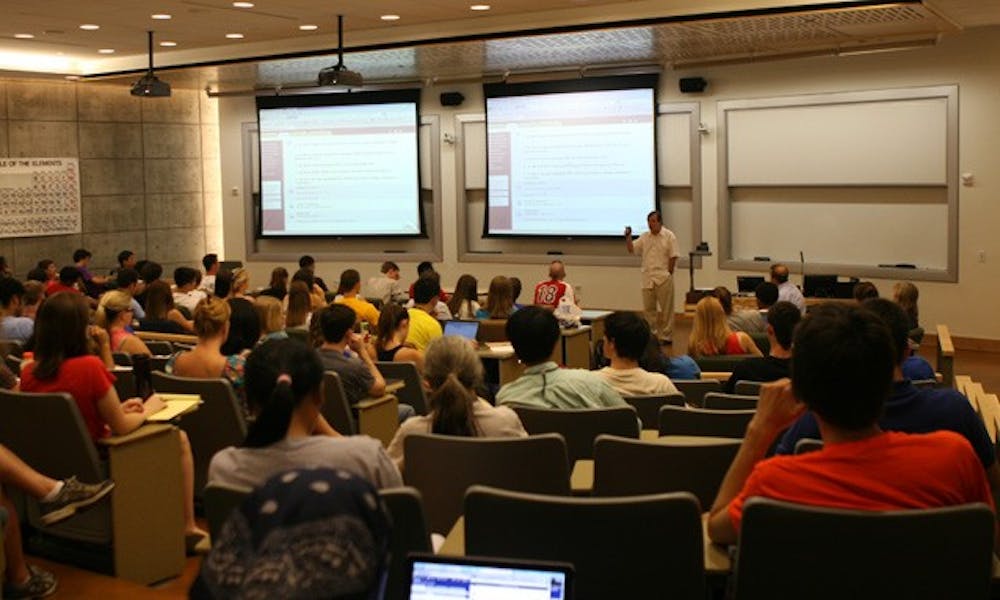It’s a tale as old as time: you enter a movie theater with the intention of escaping reality—at least for the duration of the film. The lights dim, the darkness swaddles you in a cozy trance and you briefly trade your own world for an exciting and emotional glimpse into someone else’s. Your fingers, which are greasy from the warm, buttery drip of that famous movie-theater popcorn, plunge into the medium sized bag between your knees, blindly grope for another handful of Hollywood’s sweet ambrosia and move mechanically to your lips in an endless cycle.
Then, just as the plot reaches its climax, as all the answers you have so desperately been yearning for are about to spill into your eager lap, the movie is drowned out by the startling and familiar sound of the 21st Century: a cell phone.
This epidemic, guaranteed to disturb almost every movie-going experience, is so ubiquitous that most theaters have taken to shaming their customers into not being “That Guy” through warning commercials that often precede the film.
While these commercials tend to be humorous and light-hearted, they ultimately strive to prevent the eye-rolls, glares, furrowed brows and extreme frustration that is inevitably exuded by disrupted movie-goers. A similar frustration—in which the masses come together to exert a dramatic eye-roll, a deafening sigh, or small but profound smirks of mockery—is notoriously fostered in the classroom, and manifests in response to more avid participants.
Beginning as young as elementary school, students are taught to speak, engage and share their ideas with their fellow pupils. “There is no such thing as a bad question,” teachers will sing; “all ideas are good ideas.” With these mantras in mind, many students quickly learn to raise their hands, while others slump lower in their chairs, living in constant fear of being called on.
I have always been one of the more enthusiastic classroom participants, and I often find myself jumping to answer questions—my right arm shooting quickly into the air—even before I fully digest what’s being asked. After all, a great way to retain information and assess your understanding of a concept is to see how well you can engage with it.
However, as the years have melted by and I’ve graduated from vaguely titled “science” classes in elementary school to more complex and demanding Duke courses, I’ve noticed an increasing stigma towards over-participators.
It is as though there is an invisible, yet unmistakable line on the ground, separating those who make a single insightful comment each class from the people who repeatedly raise their hand, frequently vocalizing their beliefs, verbally working out the material and asking an abundance of questions. Don’t get me wrong, I definitely associate with the latter, and through membership of this talkative group, I’ve become familiar with a startling phenomenon: a pervasive, please-stop-volunteering-to-speak, “Don’t be That Guy” sentiment.
A couple weeks ago, as my class concluded and students began to pack up their belongings and leave the room, my professor shouted “Wait a second. You guys are going to have to tell me how I can get you to participate. This class only works if you participate.” Silence—broken up by a few awkward (or guilty?) chuckles—filled the room, until one person responded, “You could give us food.” We all laughed, greatly amused at the idea that a Duke Professor, who we are lucky to have engaging us in conversation and stimulating new perspectives, would incentivize us to participate with food. After all, he could just lower our grades. Yet, as Wednesday rolled around and my class reconvened for the second time that week, my professor pulled multiple bags of candy from his briefcase and proceeded to toss candy at the students who contributed.
There are two ways of looking at this situation. The first, and the most tantalizing, is to say, “That’s hilarious, that professor sounds awesome.” While I definitely see the comedy in this situation—and I thoroughly enjoyed the Sweetarts that I received for voicing my opinions that day—I also found this somewhat troubling. This leads me to the second reaction: why, in a place like Duke, where students are brimming with curiosity and ideas, did it take bribery for students to raise their hands?
Whether we are extroverts or introverts, we are all here for the same reason: to learn. While professors, research and assignments are very obvious sources of knowledge, engaging with peers is one of the best ways to refine our thinking, adopt new perspectives and grow.
So, the next time that the talkative girl in your seminar raises her hand, or the boy in your lecture asks the professor for a clarification, take a minute before you throw your popcorn at the back of their heads. Maybe we need to change the stigma against speaking up, maybe we should all ‘be that guy.’
Carley Lerner is a Trinity sophomore. Her column runs on alternate Tuesdays.
Get The Chronicle straight to your inbox
Sign up for our weekly newsletter. Cancel at any time.

